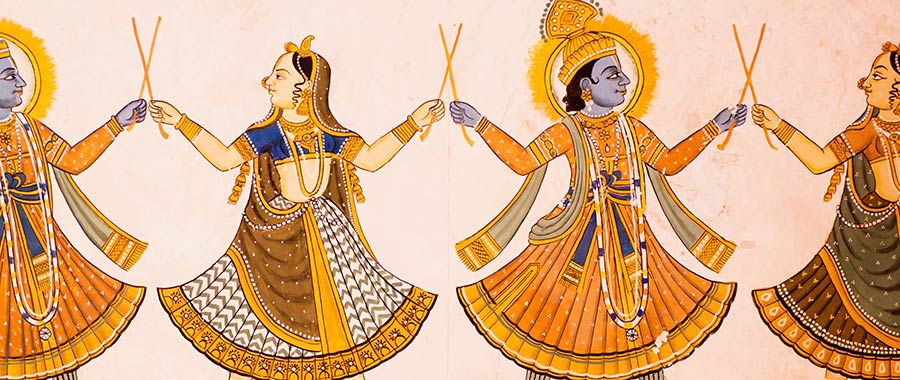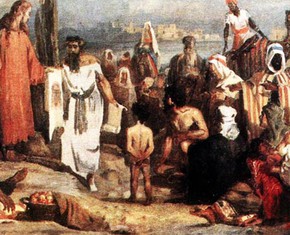The views expressed in our content reflect individual perspectives and do not represent the authoritative views of the Baha'i Faith.
Baha’is worldwide proclaim Baha’u’llah as the “Promised One” of all religions.
This refers to the truth-claim that Baha’u’llah fulfills the messianic expectations of the world’s religions. It’s quite a claim, actually. It’s even more interesting when comparing Baha’u’llah’s claims to the actual prophecies themselves.
In this series, Christian and Islamic prophecies have been the primary focus. But to illustrate the universality of Baha’u’llah’s claims, let’s take a look at some other prophetic traditions. Take Hindu prophecies, for instance. This topic is well worth exploring, considering the fact that the country with the largest population of Baha’is today happens to be India, the world’s largest democracy, where the majority of the religious population are Hindus.
How did I end up studying Hindu prophecies in the first place? Around 1980, I joined the American Academy of Religion (AAR), which is the largest learned society of scholars in the academic study of religion in America. (I was invited to join AAR by Prof. Paul Achtemeier (d. 2013), former President of the Society of Biblical Literature, which was affiliated with the AAR.) I paid my dues. But I was not a professor. Instead, I was self-taught—an “autodidact.”
The first AAR paper that I ever presented was on Hindu prophecy is available online.
In popular Hindu religion, the future Messiah will be known as Kalki (the “Destroyer”). That name alone says a great deal about the nature of these prophecies. Basically, Kalki fights a big war against his enemies, the first of whom are Buddhists! The idea that Buddhists are evil gives pause for thought.
The scenario of a cosmic battle between good and evil is a common theme that pervades apocalyptic texts throughout the world’s religions. Some of these texts are highly imaginative, as well as vivid in their scenarios of the future.
Yet these texts, generally speaking, lack imagination in one respect: they cannot conceive of the triumph of good over evil by means that are good rather than evil, especially if one considers war is basically evil—even if a war is a “necessary evil,” i.e. a “just war” for defensive purposes.
But Kalki does not defend. Instead, he conquers. In other words, Kalki is seen as a great military leader. However, he is not a great spiritual leader.
So how do we get from Kalki to Baha’u’llah in terms of fulfillment of Hindu prophecy? Here’s an even more fundamental question: Why would anyone want to see this cosmic battle take place anyway?
Let’s look at a couple of representative texts. Among the many Hindu scriptures, there is a Hindu counterpart to the Book of Revelation, the last book in the Bible which is filled with prophecies regarding the time of the end, and the return of Jesus Christ. This Hindu work is called the Kalki Purana.
At the time that I wrote my paper, the Kalki Purana had not been translated. But since then, the Kalki Purana has been translated. One translation is available on the Internet: Sri Kalki Purana, by Krishna Dvaipayana Vyasadeva, translated by Bhumipati Das and edited by Purnaprajna Das, with Sanskrit transliterations and verse translations (Mathura: Jai Nitai Press, 2006).
We all know that war is not spiritual—but Kalki fights a big war. So is Kalki spiritual?
Chapter 14 of the Kalki Purana is entitled, “ Lord Kalki Conquers the Buddhists Who Opposed Him” (pp. 148–160). One can understand the desire to defeat one’s opponents. One way is by force. Another way is by persuasion, or at least by some kind of agreement through dialogue.
Baha’u’llah did not fight a war. He was a prisoner and exile, not a military leader. As a prisoner in Akka, and before when he was in Edirne (Adrianople), Baha’u’llah proclaimed his mission to the kings and religious leaders of the world, and undertook what might be regarded as the first international peace mission of modern history. So, in order for Baha’u’llah to be the messianic fulfillment of the Kalki prophecies, we need to radically reinterpret the prophecies themselves so as to spiritualize them.
A few similar chapter titles from the Kalki Purana serve to reinforce this point: Chapter 15: “Lord Kalki Is Attacked by the Mleccha [foreign] Women: Instructions by the Weapons Personified;” Chapter 20: “Lord Kalki Travels to Bhallatanagara Sasidhvaja: a Great Battle Takes Place.”
The Kalki Purana has 35 chapters. Two of the closing chapters are entitled: Chapter 32: “Lord Kalki Enjoys Pastimes With His Consort”; Chapter 33: “The Demigods Arrive at Shambala: The Disappearance of Lord Kalki.”
Let’s take a look at chapter 19:
“The Appearance of Satya Yuga: Description of the Different Manus.” If there were to be any positive spiritual teachings in the Kalki Purana, one would expect to find them in this chapter.
Hinduism has a doctrine of cycles of time, or various “ages.” Kali Yuga is the period of greatest evil. Satya Yuga is the Golden Age, which analogously corresponds to the Millennium in Christian prophecy, except that the former lasts 4,000 (“celestial”) years, while Kali Yuga is 1,000 years (or 1,200 years, if the “transitional years” of 100 years, before and after, are included), according to Sri Yukteswar (The Holy Science, 1894, p. xv). (“Celestial” years are vast spans of time.) But these time periods vary, depending on the tradition. (Some say Kali Yuga lasts 432,000 years!) Kalki appears at the end of Kali Yuga. Chapter 19 closes with these two verses:
I am the personified Satya Yuga. During my lifetime, pure religious principles are observed and protected. I have received the name Satya Yuga because the people [of] this age are pious and truthful. – Text 17.
Lord Kalki was surrounded by His associates, and after hearing these words of Satya Yuga, He felt delighted. The Lord, in consideration of the arrival of Satya Yuga, ordered His devotees as follows, with a desire to root out Kali [a demon Kali (not to be confused with the goddess Kālī).]: “Pick up your weapons and prepare yourselves to march.”– Text 18–20.
In Chapter 20, “Lord Kalki Goes Out to Conquer Kali and His Allies,” Kalki announces:
You know very well that at the request of Grandfather Brahma, I have assumed this form of Kalki avatara [avatar] … I am just about to set out on a tour to conquer all the kings of the world.– Texts 24–25.
So there you have it: Kalki is a conqueror. Baha’u’llah is a peacemaker, who announced:
… the establishment of the Lesser Peace, details of which have formerly been revealed from Our Most Exalted Pen. Great is the blessedness of him who upholdeth it and observeth whatsoever hath been ordained by God, the All-Knowing, the All-Wise. – Baha’u’llah, Tablets of Baha’u’llah, p. 23.
In the next essay, we will further explore how Baha’u’llah, the peacemaker, can be considered the fulfillment of the Hindu prophecies regarding Lord Kalki, the conqueror.
You May Also Like
Comments

















According to Shoghi Effendi: “To Him [Baha’u’llah] the Bhagavad-Gita of the Hindus had referred as the ‘Most Great Spirit,’ the ‘Tenth Avatar,’ the ‘Immaculate Manifestation of Krishna’.” (See God Passes By, p. 95.) Here, Shoghi Effendi primarily refers to Gita 4.7–8.
Although the Bhagavad-Gita does not specifically mention the “Tenth Avatar,” yet the Mahābhārata—of which the Gita is a part—does.
In Mahābhārata 3.188.89a, the Tenth Avatar is “Kalki Viṣṇuyaśas,” i.e. “the fame of Viṣṇu,” the future incarnation of Krishna. Here, “the fame of Viṣṇu” ...is similar to the meaning of Baha’u’llah’s name, the “Glory of God.”
According to Norman, “the name Kalki is derived from Kalka and would mean ‘the destroyer of what is foul’.” … In his postface to the French translation of the Kalki Purana, Preau stresses the ambiguity of the name: “The very name of Kalki or Kalkī (both forms are found) is intriguing because kalka in Sanskrit means ‘dirt,’ ‘stain.’ … According to the Kalki Purana, Kalki would mean ‘he who removes sin or blemish from the world,’ Kalki being sometimes referred to as kalkavināśana, ‘the destroyer of blemish’.”
...
– Dominique-Sila Khan, “The Coming Of Nikalank Avatar,” Journal of Indian Philosophy, Vol. 25, No. 4 (August 1997), pp. 410–411.